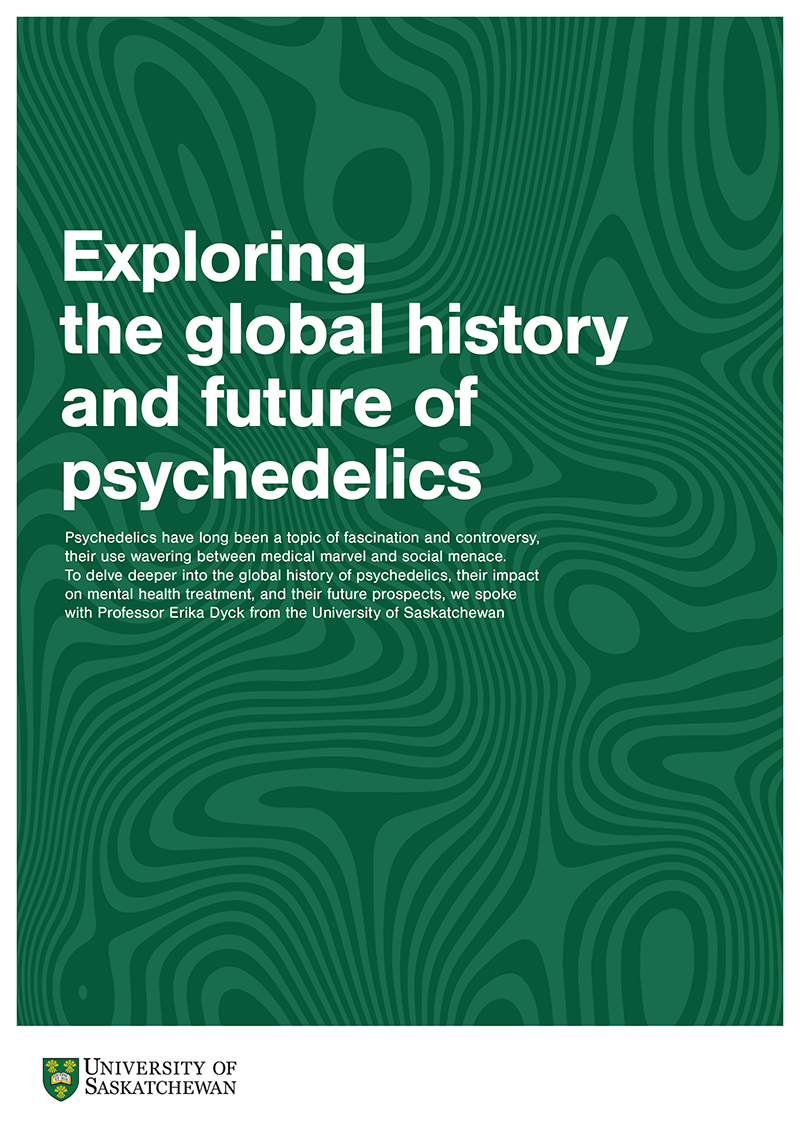Psychedelics have long been a topic of fascination and controversy, their use wavering between medical marvel and social menace. To delve deeper into the global history of psychedelics, their impact on mental health treatment, and their future prospects, we spoke with Professor Erika Dyck from the University of Saskatchewan
Professor Dyck’s extensive research offers invaluable insights into the cultural, societal, and regulatory dynamics that have shaped the use and perception of psychedelics worldwide.
Global perspectives on psychedelics
Why do you believe that global perspectives are important when examining the history of psychedelics?
Professor Dyck explains that much of the history of psychedelics has been examined through a North American lens, particularly the rise and fall of psychedelics in the United States. However, a broader perspective reveals diverse and dynamic histories, including indigenous uses and ceremonial practices that challenge conventional notions of safety and risk. Understanding these global narratives can provide a more comprehensive view of psychedelics’ potential future.
Cultural and societal influences
How have cultural, societal, and regulatory factors influenced the use and perception of psychedelics across different regions of the world?
“Different jurisdictions have varied significantly in their approach to psychedelics,” Dyck notes. “While the United States’ story dominates pop culture, countries like Czechoslovakia continued psychedelic research into the 1970s despite a United Nations prohibition. This research focused on treating trauma and addiction, often progressing in isolation due to Cold War politics. By looking across those boundaries, I think there are different opportunities to study the politics of prohibition that really had very little to do with the health and science.”
Historical treatment approaches
Can you share some insights from your research regarding the historical approaches to treating mental illnesses with psychedelic substances in different jurisdictions?
In the 1950s and ‘60s, psychedelics were used to treat various conditions, much like today. The focus was on trauma and addiction, with psychedelics providing a consciousness-raising experience that contrasted with symptom-numbing pharmaceuticals. This historical context shows the potential for psychedelics to address existential and emotional pain in unique ways, Dyck explains.
How have these approaches evolved over time, and what lessons can we draw from them?
Dyck highlights a significant change in evaluation methods: “Historically, case-based studies were common, but today’s research emphasizes randomized controlled trials. Modern researchers recognize the need to study psychedelics in these combined contexts to understand their true efficacy. We need to think about this together. I think we’re learning about different ways of evaluating the efficacy of these substances or the practices that accompany them using methods that also begin to challenge the primacy of the RCT.”
Public attitudes and policies
What are some of the key factors that have shaped public attitudes and policies toward psychedelic substances globally? How have these attitudes and policies impacted access to psychedelic therapy and research?
Dyck remarked, “Public attitudes have been significantly influenced by cultural moments, such as the 1960s counterculture movement. Psychedelics were associated with social and political rebellion, leading to their stigmatization and criminalization. This stigma persists, affecting contemporary access to psychedelic therapy and research. Despite scientific advancements, cultural perceptions continue to shape regulatory policies and public acceptance.”
Health, social justice, and historical perspectives
How do you see the intersections of health, social justice, and historical perspectives manifesting in the history of psychedelics, particularly regarding issues such as criminalization, medicalization, and access to care?
Professor Dyck highlights the early use of psychedelics to understand and empathize with patients experiencing psychosis, leading to advocacy for patient rights. Today, patients lobby for access to psychedelics to treat various mental health conditions. This advocacy challenges the legal classification of psychedelics, revealing contradictions between outdated laws and current scientific evidence. Social justice movements continue to push for changes in policy to reflect the therapeutic potential of psychedelics.
Informing current practices
As psychedelic-assisted therapy gains more attention and legitimacy in the medical community, how can historical research inform current practices and policies surrounding the therapeutic use of psychedelics?
Historical research offers valuable lessons, particularly in understanding the relationship between the drug and its context (set and setting), explained Dyck. Modern psychedelic therapy often involves a combination of drug administration and psychotherapeutic support, echoing past practices but adapting to contemporary clinical settings. This historical perspective can help refine current methodologies and improve therapeutic outcomes.
Future challenges and opportunities
What are some of the challenges and opportunities you foresee in the future of psychedelic research and therapy, both globally and within specific jurisdictions?
There are opportunities to look to the past to see what we might still want to retain rather than just trying to improve upon it and push it away, Dyck suggests. She also highlights the potential for global collaboration in real- time, facilitated by modern communication technologies.
We can collaborate across different lines, create different kinds of alliances, and imagine new ways to move this information across jurisdictions. However, the spread of misinformation remains a challenge.
Concluding insights on the history of psychedelics
What do you hope readers will take away from your book and your research on the global history of psychedelics?
“I hope readers will see that there’s a really dynamic and diverse set of ways that people have come to know psychedelics,” Dyck concludes. “For all of human history, we’ve been trying to understand consciousness and explore existential and emotional traumas. It’s heartening and humbling to see just how widely and diversely these kinds of experiences have persisted. We’re certainly not the first to re-engage with these ideas.”


